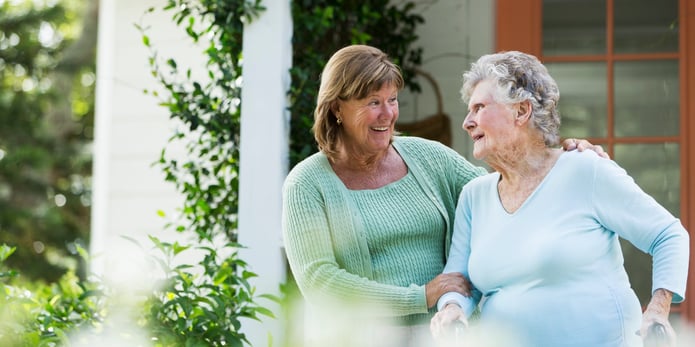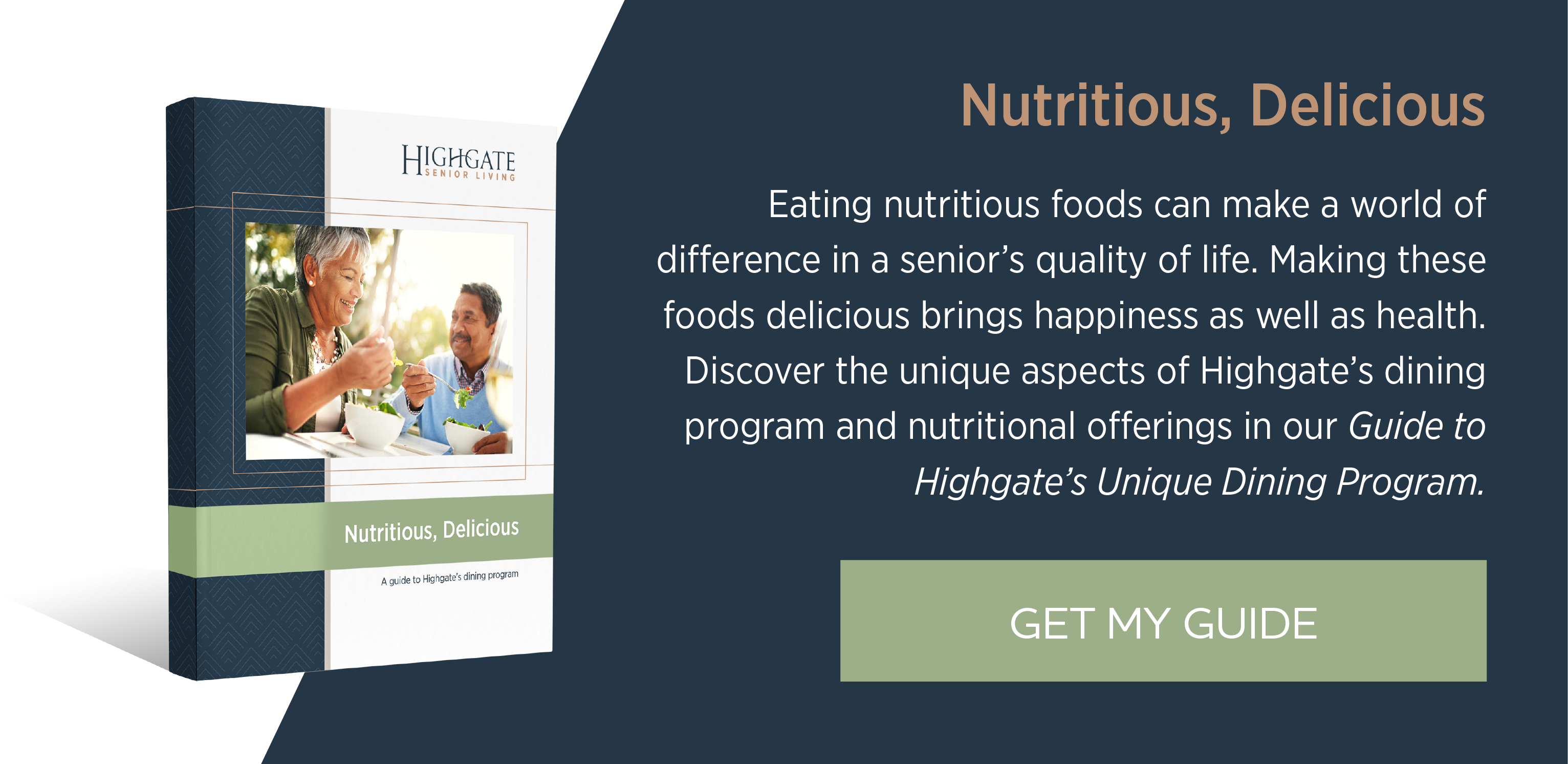
Most people gain weight when they age. However, if your loved one is experiencing rapid or significant weight gain, it could not only be a sign of an underlying health condition but also put them at a high risk for developing many other diseases.
Why Seniors Gain Weight When They Age
Every body is different, so the reasons why seniors tend to gain weight are different, too.
“Your body is going to change as you get older,” says Cinnamon Fuller, Health Care Director and Focus Trainer at Highgate at Great Falls. “That’s normal.”
People may gain weight as they get older because:
- They experience age-related muscle loss and don’t lift weights to maintain their muscle mass.
- They are less physically active and more sedentary.
- They are eating more calories but their metabolism has started to slow down.
- They are experiencing major life changes that lead to stress, depression, anxiety, or lack of sleep.
Rapid weight gain among seniors can also be due to some more surprising reasons. Your loved one might be gaining weight because:
- They are taking medications to treat seizures, diabetes, high blood pressure, depression, or psychiatric disorders, which are linked to weight gain.
- They are retaining fluid in the stomach area, ankles, legs, or feet, which may be a sign of heart failure.
- Their kidneys aren’t functioning currently, so their body is retaining fluid, resulting in weight gain.
- They are struggling with hypothyroidism, which can slow down metabolism, leading to weight gain.
“Unfortunately, it’s more dangerous for the elderly to be overweight or obese,” Fuller says. “Significant weight gain can lead to metabolic syndrome, which occurs when you develop multiple risk factors.”
In other words, carrying too much weight around the waist can lead to increased blood pressure, high blood sugar, and abnormal cholesterol or triglyceride levels — which increase the risk of heart disease, stroke, and Type 2 diabetes.
Because many chronic illnesses develop in old age already, it’s especially important for seniors to maintain a healthy weight.
Tips for Seniors to Avoid Obesity
Your loved one doesn’t need to strive to be the same weight they were as a teenager. They can be strong, fit, and healthy no matter how old they get. Here is Fuller’s advice for family caregivers who want to help their loved one lose weight or avoid obesity.
1. Make a Doctor Appointment
If your loved one is experiencing rapid and unintentional weight gain with no clear cause, they should see their doctor.
“Their physician needs to do a physical exam to ensure there is not a medical reason for weight gain,” Fuller says.
The doctor will ask about your loved one’s medical history and any additional symptoms as well as run blood tests to determine if there’s anything underlying and develop a treatment plan. These Health Information Trackers can help ensure your loved one’s doctor is aware of any health concern and that you get answers to any questions you may have.
2. Move More and Sit Less
Your loved one doesn’t have to start training for a 5K, but they should try to move more.
“Older adults who struggle with weight should focus on low-impact physical exercise and activities that are designed to preserve muscle and bone mass, including stretching, aerobics, and strengthening exercises,” Fuller says.
Although it may be uncomfortable to get started, encourage your loved one to add physical activity to their daily life. Perhaps they start by walking for 10 minutes at a time, slowly increasing the total amount of time they are active and the number of days they are active.
3. Adopt a Healthier Diet
The most important aspect of managing weight is diet.
“A well-balanced nutritional meal with portion control is best to help lose weight or to avoid obesity,” Fuller says.
Superfoods for seniors include salmon, blueberries, spinach, walnuts, carrots, lentils, oatmeal, apples, asparagus, and Greek yogurt. If your loved one is more of a meat-and-potatoes eater, check out this Nutrition Checklist for Older Adults, which offers more than 30 tips to help you empower your loved one to eat healthily.
4. Drink Up
Did you know that it’s easy to confuse the sensation of thirst for hunger? Plus, staying hydrated not only helps ramp up metabolism but also breaks down fat.
“Stay hydrated by drinking low-sugar vitamin waters, healthy natural juices, green tea, and lots of basic water,” Fuller says.
5. Monitor for Signs of Depression
If you’ve ever turned to ice cream or chocolate after a bad day, you know that our emotions can influence what we choose to eat. However, excessive sugar in a diet has been linked to depression, diabetes, and dementia.
Artificial sweeteners can cause insomnia as well as changes in mood, further lending a hand to depression, and saturated fats cause clogged arteries that can decrease blood flow to the brain, making it difficult to fight off “the blues.”
“As we age, we can become more susceptible to depression,” Fuller says. “It’s important to monitor your loved one for warning signs.”
6. Develop Community Support
As your loved one ages, their need for socialization and purpose increases. A common trap older adults fall into is believing that they’ve already experienced the prime of their lives and that the time after retirement is just one long, steady decline.
In addition to making changes to eating and exercise, your loved one might benefit from support from others committed to maintaining a healthy lifestyle.
Fuller recounts a story about a woman who moved into Highgate and was concerned about her weight: “Laverne was feeling weak and unhealthy. We were able to get her on a specialty diet and doing daily exercise. As she began to feel stronger, she started participating more in the community. Soon, she had a purpose and started Laverne’s News Corner, where she read the newspaper to other residents who were unable to read it. She even became involved with the food committee and started a recycling program.”
Thanks to Highgate’s unique dining program and commitment to holistic health, many seniors are able to turn their health around after moving into the senior living community.
“Our services are designed to help residents thrive again, whether it’s daily exercise, delicious and nutritious meals, monitoring for depression, monitoring for medication side effects, socialization, or generally assisting the resident to live a life of purpose.”
For a more in-depth look at the unique aspects of Highgate’s dining program and nutritional offerings, check out our Nutritious, Delicious eBook.






